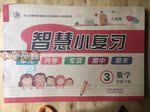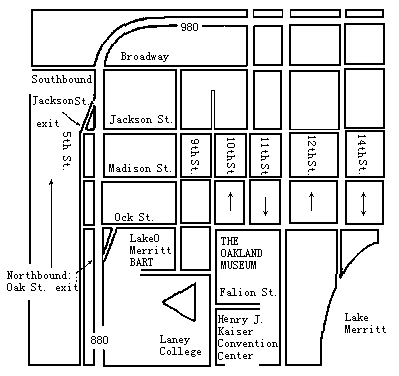
| |||||||||||||||||||||||||||||||||||||||||||||||||||||||||||||||||||||||||
 ÖÇ»ÛС¸´Ï°ÏµÁдð°¸
ÖÇ»ÛС¸´Ï°ÏµÁдð°¸
| Ä꼶 | ¸ßÖÐ¿Î³Ì | Ä꼶 | ³õÖÐ¿Î³Ì |
| ¸ßÒ» | ¸ßÒ»Ãâ·Ñ¿Î³ÌÍƼö£¡ | ³õÒ» | ³õÒ»Ãâ·Ñ¿Î³ÌÍƼö£¡ |
| ¸ß¶þ | ¸ß¶þÃâ·Ñ¿Î³ÌÍƼö£¡ | ³õ¶þ | ³õ¶þÃâ·Ñ¿Î³ÌÍƼö£¡ |
| ¸ßÈý | ¸ßÈýÃâ·Ñ¿Î³ÌÍƼö£¡ | ³õÈý | ³õÈýÃâ·Ñ¿Î³ÌÍƼö£¡ |
¿ÆÄ¿£º³õÖÐÓ¢Óï À´Ô´£º¸£½¨Ê¡ÏÃÃÅÍâ¹úÓïѧУ2011½ì¾ÅÄ꼶ÉÏѧÆÚÆÚÖп¼ÊÔÓ¢ÓïÊÔÌâ ÌâÐÍ£º050
| |||||||||||||||||||||||||||||||||||||||||||||||||||||||||||||||
²é¿´´ð°¸ºÍ½âÎö>>
¿ÆÄ¿£º³õÖÐÓ¢Óï À´Ô´£ºÖп¼Ä£ÄâÌâÈý ÌâÐÍ£º050
ÔĶÁÀí½â

¡¡¡¡THE OAKLAD MUSEUM 1000 OAK STREET OAKLAND, CA 94607
¡¡¡¡One block from the Lake Merritt BART station.
¡¡¡¡PARKING
¡¡¡¡The museum parking garage, with entrances on Oak St. and 12th St., is open 8 a. m.to 6p. m. weekdays, 10a. m. to 5p. m. Saturdays, and noon to 7p. m. Sundays.
1£®This map is mainly for people going to ________.
[¡¡¡¡]
2£®Through which street can people drive to the museum?
[¡¡¡¡]
 street.
street. street.
street. street.
street.3£®Which is the correct description of one's way to drive to the museum?
[¡¡¡¡]
A£®Exit at Jackson street, turn into Jackson St, turn right at the 11th St.
B£®Turn right at the Oak Street, turn right at the 9th street.
C£®Exit to the Oak Street, drive straight ahead, turn left at the 11th street.
D£®Turn left to the 14th street, turn left to the Oak Street.
4£®The Oakland Museum is open ________.
[¡¡¡¡]
5£®The museum parking garage must be on the ________ side of the museum.
[¡¡¡¡]
²é¿´´ð°¸ºÍ½âÎö>>
¿ÆÄ¿£º³õÖÐÓ¢Óï À´Ô´£ºË«É«±Ê¼Ç°ËÄ꼶ӢÓï(ÉÏ) ÌâÐÍ£º050
ÔĶÁÀí½â
ÔĶÁÏÂÃæ¶ÌÎÄ£¬¸ù¾Ý¶ÌÎÄÄÚÈÝÑ¡Ôñ×î¼Ñ´ð°¸£®
¡¡¡¡Dear Roni,
¡¡¡¡Italy is wonderful. We started in Rome two weeks ago, drove to Florence last week and now we're on our way to Venice. Three weeks just isn't enough.
¡¡¡¡The country near Florence is so beautiful£hills, olive trees. And red roofs(Îݶ¥) of the houses look so nice far away.
¡¡¡¡I am afraid I am getting bigger£the food here is so delicious!
Love,
Akemi
¡¡¡¡Roni Lebaver
¡¡¡¡222 Main St. Languna
¡¡¡¡Beach, CA 92651
¡¡¡¡U. S. A.
¡¡¡¡Hi Roni,
¡¡¡¡I can't believe(ÏàÐÅ) you went to school here in Honolulu! Why did you leave?
¡¡¡¡I spend each morning on the beach(º£Ì²) and in the water. The sand is so soft and the beaches seem so long. The water is just the right temperature.
¡¡¡¡One afternoon, I left the beach to walk in mountains near Honolulu. I enjoyed myself very much there.
¡¡¡¡How I miss you!
Mari
¡¡¡¡Roni Lebaver
¡¡¡¡222 Main St. Languna
¡¡¡¡Beach, CA 92651
¡¡¡¡U. S. A.
¡¡¡¡Dear Roni,
¡¡¡¡Maybe I'm strange but I love the desert(ɳĮ)!
¡¡¡¡Last week, our group spent four days in the desert. At times, it felt like the moon.
¡¡¡¡I always thought deserts were all the same! They are not. Some parts look like mountains; others are really different.
¡¡¡¡And when we find something green££a few plam trees, a little water, we feel good and great.
¡¡¡¡See you in September,
Kim
¡¡¡¡Roni Lebaver
¡¡¡¡222 Main St. Languna
¡¡¡¡Beach, CA 92651
¡¡¡¡U. S. A.
1£®Who seems to have eaten too much?
[¡¡¡¡]
2£®Who went to school in Honolulu?
[¡¡¡¡]
3£®Who spent four days on the moon?
[¡¡¡¡]
4£®Where does Roni live?
[¡¡¡¡]
5£®Which of the sentences is true?
[¡¡¡¡]
A£®Akemi arrived in Rome two weeks ago.
B£®Mari spends every morning and afternoon on the beach.
C£®Deserts always look the same.
D£®Mari had a good time in Honolulu.
²é¿´´ð°¸ºÍ½âÎö>>
¹ú¼ÊѧУÓÅÑ¡ - Á·Ï°²áÁбí - ÊÔÌâÁбí
ºþ±±Ê¡»¥ÁªÍøÎ¥·¨ºÍ²»Á¼ÐÅÏ¢¾Ù±¨Æ½Ì¨ | ÍøÉÏÓк¦ÐÅÏ¢¾Ù±¨×¨Çø | µçÐÅթƾٱ¨×¨Çø | ÉæÀúÊ·ÐéÎÞÖ÷ÒåÓк¦ÐÅÏ¢¾Ù±¨×¨Çø | ÉæÆóÇÖȨ¾Ù±¨×¨Çø
Î¥·¨ºÍ²»Á¼ÐÅÏ¢¾Ù±¨µç»°£º027-86699610 ¾Ù±¨ÓÊÏ䣺58377363@163.com